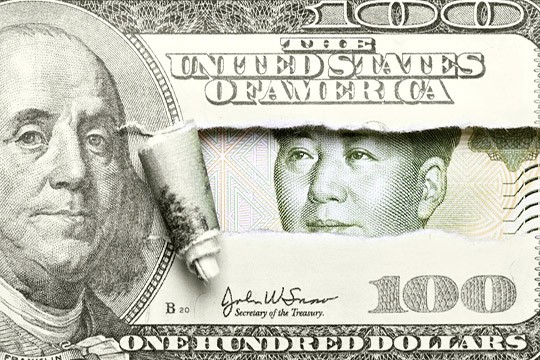For now, the threat of the dollar losing its status as the world’s premier currency may be exaggerated. It is also at odds with the latest findings of the Official Monetary and Financial Institutions Forum, writes ‘The Hill’.
The results show that a net 18 percent of central banks plan to increase their allocation to the dollar over the next one to two years due to high U.S. interest rates. Central bank holdings of the Chinese renminbi are expected to stay around 3 percent for a while longer.
But there are two scenarios, however, whereby the dollar really could weaken in the next year or two.
One is a benign decline associated with Fed easing.
The other is a dollar crisis that could lead to a loss of investor confidence.
The more likely outcome is the first scenario, considering there has not been a full-fledged dollar crisis since the mid-late 1980s.
With U.S. inflation currently around 3 percent, the principal driver of the dollar is interest rate differentials between the U.S. and abroad. The dollar has been strong in the last year and a half mainly because the U.S. economy has outperformed its peers and interest rate differentials have favored it against the Japanese yen, the euro and the renminbi.
Looking ahead, the dollar could soften if the Fed eases monetary policy. Fed officials’ latest “dot plot” survey indicates they now foresee only one rate cut of 25 basis points this year, but four cuts next year if inflation moderates. This “soft landing” outcome could accompany an ongoing rally in financial markets.
The risk of a dollar crisis would increase if the trade conflict with China were to escalate. There are already some signs of increased trade frictions, as Biden recently announced higher duties on select imports from China. But a full-fledged trade war is more likely if Trump becomes president and doubles down on tariffs imposed in 2018-2019.
During the current campaign, Trump has called for raising tariffs on Chinese goods by up to 60 percent and 10 percent on all other imports. If so, this action would have a greater impact on the U.S. economy than the initial round, because it would boost tariff revenues to 17 percent of U.S. imports from 2 percent, according to Greg Ip of the Wall Street Journal.
The potential for the trade conflict to escalate is high, because China is seeking to bolster its economy by increasing exports, and it has circumvented U.S. tariffs by shifting production to Mexico and Vietnam. However, according to The Economist, Trump’s former aide Peter Navarro is advising him to impose tariffs on Chinese goods produced in these countries.
The closest parallel to the current situation is the mid-1980s, when the U.S. ran record trade deficits and the dollar was exceptionally strong.
The Reagan administration sought to depreciate the dollar in an orderly manner by coordinating foreign exchange market intervention and monetary policy with Japan and Germany via the Plaza Accord (1985) and Louvre Accord (1987). However, a policy dispute in the fall of 1987 led to a crisis in which the dollar plummeted while U.S. bond yields surged and the stock market crashed.
History may not repeat this time, because inflation expectations in the U.S. are lower now. Also, the magnitude of trade and current account imbalances is smaller today…
What does this all mean for the U.S. and global economy? Thirty-five years ago, the collapse of the Soviet bloc spurred growth in world trade as COMECON folded and Eastern European countries became integrated with Western Europe.
The result could be the opposite this time. If a trade war breaks out and the global trading system splinters into two camps, the post-World War II order that contributed to peace and prosperity would be breached irrevocably.
It is therefore incumbent upon politicians on both sides to consider that their policy actions could have unintended consequences, before the situation gets out of hand.
read more in our Telegram-channel https://t.me/The_International_Affairs

 10:59 05.07.2024 •
10:59 05.07.2024 •























